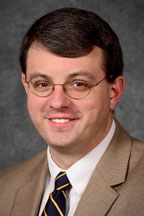DELEGATE ROGER HANSHAW'S CAPITOL COMMENTS
 Delegate Roger Hanshaw (R-Clay, District 33) roger.hanshaw@wvhouse.gov
Delegate Roger Hanshaw (R-Clay, District 33) roger.hanshaw@wvhouse.govThe 2015 Regular Session of the West Virginia Legislature is now one for the history books. Last Saturday night, March 14, the regular session came to a close. According to the West Virginia State Constitution, our Legislature is a citizen legislature which meets for only sixty (60) days each year, unless the governor calls a special session. That regular sixty-day session is now over and the members are headed home.
The legislature spent most of these past sixty days taking steps to bring West Virginia more in line with our surrounding neighbor states in order to make West Virginia a more attractive place to start and grow a business. Much of that work will take time to pay off, but some things will be immediately visible. Some bills adopted this year have already been signed into law by our Governor, and other measures are still on his desk awaiting his signature or veto.
Among the most significant parts of this year's session was the comprehensive approach our legislature took to bringing our legal system more in line with other states. This approach involved twelve bills that addressed everything from the election of our judges to the amounts a defendant can be made to pay for a wrong he or she did not cause. Beginning next year, our state's judges will be elected on a non-partisan ballot.
West Virginia was among the very last states in the country to have partisan judges, and this system left many parties to a court case feeling like their case was decided by politics instead of the law. This new approach should take away some of that appearance.
Similarly, we also adopted a system of comparative fault this year which will make defendants in a lawsuit responsible for only the part of an injury he or she caused rather than the entire amount of a judgment. This system is only fair, and it has been long overdue in West Virginia. These and other measures adopted this year will put our legal system on a more even footing with our neighbors and make West Virginia more hospitable to those men and women who want to start and grow a business here in our State.
At the request of the coal industry and the coal miners in West Virginia, the legislature also adopted the 2015 Coal Jobs and Safety Act this year. This bill, written by coal miners, will bring our state's mining laws up to par with the federal laws and strengthen the drug testing requirements for coal miners. It will also remove some of the environmental restrictions which were more stringent than federal law requires.
The objective of this bill was to make West Virginia coal more competitive in the marketplace and make it easier for West Virginia companies to compete with those in other parts of the country. We are hopeful these measures pay off, and pay off quickly. Governor Tomblin signed this bill into law late last week. Many folks have asked questions about the Coal Jobs and Safety Act since its adoption, and in a future column I will provide a more detailed summary of this bill and describe the specific changes it will make.
This week Governor Earl Ray Tomblin called a special session for members of the House and Senate to work with him on crafting the state budget for fiscal year 2016. When Governor Tomblin released his original budget earlier this year, he eliminated the popular Community Participation Grant Program which has funded many worthwhile projects in our District over the past several years.
I am hopeful our budget negotiations can restore some of the funding eliminated by the Governor in order to keep these opportunities available to our local nonprofit organizations, libraries, and municipalities. In small counties like ours, a few thousand dollars can mean the difference between a program which can operate well and do tremendous work in our communities, and one that cannot function at all. I am hopeful our leaders recognize this.
With the close of one legislative session comes the planning for the next one, and that process has already begun for me. I was fortunate to hear from many of you during the past sixty days on bills and resolutions that were before the House of Delegates for consideration. I am looking forward to working with many of you during the summer and fall to develop our agenda for the next session, which will be here before we know it. It can take time to put together the proposals needed to address the biggest problems we face as a District, but we have to do it.
These upcoming months will be a time for all of us to work collectively on topics like funding for road construction, working with our law enforcement and judicial communities on reducing our crippling jail bills, keeping our local libraries open and viable, and of course, encouraging more small business growth and development in our communities. That work will require input from all of us, and I hope I can count on many of you to contribute to it.